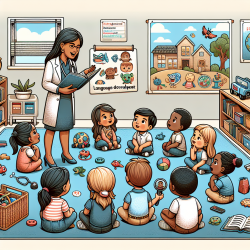Introduction
Family caregivers play a pivotal role in the healthcare system, often providing extensive support to seniors with chronic conditions. The research article "The voices of family caregivers of seniors with chronic conditions: a window into their experience using a qualitative design" offers invaluable insights into the challenges and facilitators of resilience among caregivers. This blog aims to guide practitioners in speech language pathology and related fields on how to leverage these insights to improve their practice and outcomes for children and families.
Understanding the Caregiver Experience
The study highlights several barriers to resilience faced by caregivers, including:
- Demands on time and energy
- Shifting roles and responsibilities
- Financial strains and changing family dynamics
- Emotional and physical exhaustion
These challenges can significantly impact the well-being of caregivers, potentially affecting the care they provide. Practitioners can use this understanding to develop more empathetic and supportive interactions with caregivers, recognizing the multifaceted nature of their experiences.
Facilitators of Resilience
Caregivers identified several factors that help bolster their resilience, such as:
- Personal motivations and a sense of purpose
- Spirituality and coping strategies
- Support from family, friends, and healthcare systems
By acknowledging and reinforcing these facilitators, practitioners can create a more supportive environment that enhances caregiver resilience. This might involve connecting caregivers with community resources, facilitating support groups, or simply providing a listening ear.
Recommendations for Practitioners
The research provides several recommendations that practitioners can implement to better support caregivers:
- Enhance education for both caregivers and healthcare professionals about dementia and caregiving challenges.
- Improve access to resources and system navigators to assist caregivers in managing their responsibilities.
- Advocate for a caregiver-centered system that is responsive to the unique needs of each family.
By integrating these recommendations into practice, practitioners can help reduce caregiver burden and improve the overall quality of care provided to seniors.
Encouraging Further Research
While the study offers valuable insights, it also highlights the need for further research into caregiver experiences and resilience. Practitioners are encouraged to engage in or support research efforts that explore innovative ways to support caregivers, particularly in diverse and underserved communities.
Conclusion
Understanding and supporting family caregivers is crucial for sustaining the healthcare system and ensuring the well-being of seniors. By applying the insights from this research, practitioners can enhance their skills and contribute to better outcomes for caregivers and care recipients alike.
To read the original research paper, please follow this link: The voices of family caregivers of seniors with chronic conditions: a window into their experience using a qualitative design.










